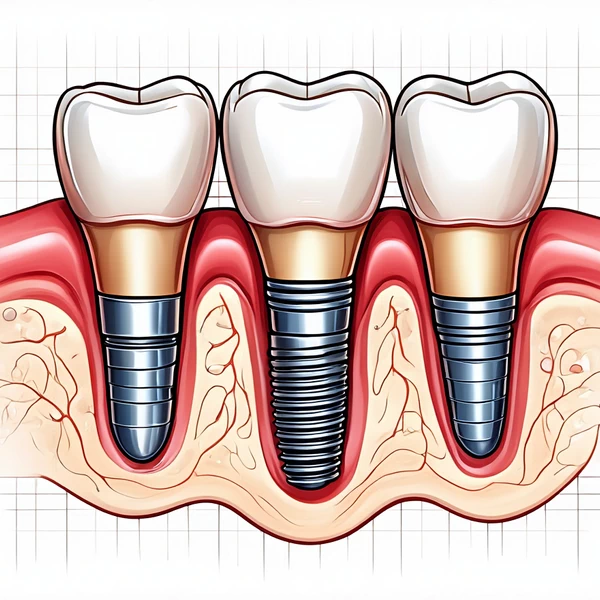Dental Implants in Alexandria, VA
Losing only one tooth transforms everything. Your chewing is different, speech, laughing—and, in photos, the way you feel about smiling. Apart from Alexandria, VA dental implants, which replace the root, prevent the jawbone from dying, and provide you with teeth you will never remove, nothing works. Not one paste for myriads. No bridge catches food.
We have provided 7,200 implants in Old Town Alexandria since 2010. We offer you every minute detail is the page – what truly are implants, who qualifies, how it sounds, how long it lasts, and all expenses. Choose the most favorable alternative with zero strain.
Schedule an appointment
What’s Your Dental Implant, Exactly?
Titanium Tooth Root.
Imagine some tiny screw—resembling the size of a grain of rice—a dentist pulled it from your jawbone. For a future tooth route, Even mildly. Best. It is a post of implants. Resting here. A bone grows – it’s trapping. A crown of porcelain is added subsequently.
Result? The tooth:
- Appears like the others—identical.
- Feels tight on the bite.
- Say “Hello” to the sunken face from bone loss.
- The future of 25 years or so—often lasts your whole life.

Contact Alexandria Dentist today!
To schedule an appointment with our dentists
Why Do 94% of Our Patients Select Implants On Bridges or Dentures?
| Concern | Dental Implants | Fixed Bridges | Removable Dentures |
|---|---|---|---|
| Does it stop bone loss? | Yes – stimulates jaw like the roots | No – bone melts away under the gap | No – speeds up collapse |
| Can I eat steak, apples, corn? | 99% natural bite force | 60–70% (risk of cracking) | 20–30% (food gets trapped) |
| Will it look fake? | No – shade, shape, and design match the patient | Sometimes gray at the base | Often bulky, pink plastic |
| Daily cleaning | Brush + floss normally | Special threaders; higher decay risk | Soak, scrub, and re-glue nightly |
| Long-term cost | Lowest – one-time | Medium (replace every 7–12 years) | Highest – relines, replacements |
| Speech | Natural “S” and “F” sounds | Can whistle or click | Often slurs words |
Meet the Surgeons Who Place Every Implant (No Assistants, No Residents)
Dr. Elena Chen, DDS, MS
- Prosthodontist & Implant Artist
- Specialty: Designing smiles should fit your face shape
- Training: 3-year prosthodontics residency + Mayo Clinic fellowship
- Superman: Digital Smile Design—you see your new teeth before we start
- Fun fact: Paints watercolor portraits of patients’ “before” smiles as gifts

Dr. Marcus Tate, DMD
- Oral & Maxillofacial Surgeon
- Specialty: Complex bone grafting, All-on-4, zygomatic implants
- Training: Walter Reed National Military Medical Center—implanted thousands of wounded warriors
- Superpower: Places implants using X-Guide GPS navigation (0.2mm accuracy)
- Fun fact: Ironman 70.3 competitor—same endurance as a 6-hour surgery

“I bit into a caramel apple at the Del Ray Farmers Market—first time in 8 years. No pain, no fear, no denture flip. Just joy.”
Carla F., 62
They get two brains and one price
They consult with each other about each case. You fix everything for one price.
- Day 0
Free 3 – D CT Scan + Digital Smile Preview. Excited, informed. - Day 1
Surgery (IV sedation) + temporary tooth. Sleep through it. - Day 2-7
Mild soreness (Advil level). Eat pasta, soup. - Week 2
Stitches dissolve, swelling gone. Back to work. - 1-3 month
Bone bonding (you feel nothing). Eat normally. - 3–6 months
Final crown attached. “These are my teeth!”.
Teeth-in-a-Day: From Broken to Beautiful in 6 Hours
- Morning – 8 AM
Arrive with failing teeth or wobbly dentures. IV sedation → you nap. Dr. Tate removes bad teeth, place 4- 6 implants. - Afternoon / 2 PM
Dr. Chen attaches a fixed acrylic bridge (strong, light ). Bite adjusted with digital sensors. You leave eating dinner. - 6 months later
Swap acrylic from zirconia final teeth (metal – free, chip proof ).
Over 1,800 Alexandrians have done this. Zero overnight hospital stays.
Bone Loss? Here’s How We Fix It ( 98% success)
| Problem | Solution | Time added |
|---|---|---|
| low bone volume | PRF(your blood) + synthetic graft | 3 months |
| Sinus too low ( upper back ) | Internal sinus lift (same day ) | None |
| Severe upper atrophy | Zygomatic implants | None |
| Thin jaw ridge | Ridge expansion + mini implants | 3 months |
| PRF Explained:the spin your blood in a centrifuge | growth factors | healing 40% faster, less swelling |
Questions – Answered
- Do implants hurt?
Less than a root canal. IV sedation = zero memory. Most take only ibuprofen day 2. - Can I eat right after surgery?
Soft foods (pasta, eggs) for 48 hours. Then anything. - Will people notice the gap during healing?
Never. *You leave with a temporary tooth. - What if I grind my teeth?
We make a custom nightguard. Free with full cases.
Certifications & recognition
- American Academy of Implant Dentistry (AAID).
- International Congress of Oral Implantologists (ICOI) Diplomata
- All-on-4® Center of Excellence
- Northern Virginia Magazine Top Dentist 2021–2025
- Invisalign Diamond Provider

Make an appointment
325 South Fairfax Street Alexandria VA 22314
703-255-8900
Opening Hours
Mo-Fr 8:00 am – 5:00 pm
Sa 9:30 am – 3:00 pm
